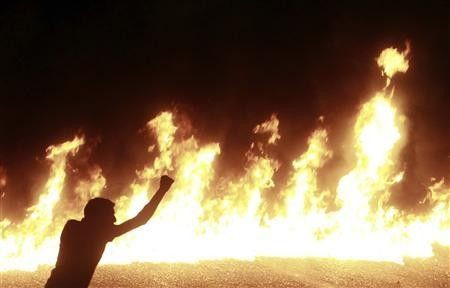Group Charges Cover-Up After Egyptian Military Violently Put Down Coptic Protest

A prominent human rights organization found that the Egyptian military employed excessive force to suppress a recent protest by Coptic Christians and called for the military to hand off its investigation of the incident to an independent body.
The report, compiled by Human Rights Watch, concluded that the military's violent intervention in the Oct. 8 demonstration compromised its ability to conduct an impartial investigation. The Supreme Council of Armed Forces has effectively ruled Egypt since former president Hosni Mubarak's fall, and whether it allows a separate probe will reflect its willingness to relinquish power.
Cannot Investigate Itself
The military cannot investigate itself with any credibility, Joe Stork, deputy Middle East director at Human Rights Watch, said in the report. This had been an essentially peaceful protest until the military used excessive force and military vehicles ran over protesters. The only hope for justice for the victims is an independent civilian-led investigation that the army fully cooperates with and cannot control and that leads to the prosecution of those responsible.
Incensed by the government's failure to prevent a series of attacks on churches, Coptic Christians poured into the street for an Oct. 8 demonstration that swiftly devolved into bloodshed, ultimately leaving two dozen bystanders dead. Participants and witnesses said that troops drove armored vehicles through the crowd and fired on protesters without being provoked, an account that was corroborated by independent video. Egyptians have accused the government of seeking to foment sectarian violence, pointing to a broadcast on state television that urged Egyptians to protect soldiers against the protesters and noting that Muslims joined Copts for the demonstration.
It was the deadliest clash since Mubarak's ouster, and it intensified calls for the Supreme Council of Armed Forces to hand off authority to a civilian government. But in addition to denying that troops deliberately employed violence, the government has tasked military prosecutors with investigating the incident.
It's clear that the amount of deaths almost presupposes some excessive use of force, according to testimony we gathered, said Dan Williams, a researcher at Human Rights Watch. It smacks of a cover up.
Revolution's Europhia Runs Into Egypt's Practices
The euphoria of the revolution has steadily given way to the realization that the Supreme Council of Armed Forces maintains many of Mubarak's authoritarian practices. It has delayed elections, shaped the contours of the forthcoming and re-instituted an Emergency Law, a hated symbol of Mubarak's power that grants broad authority to detain people without charge.
The Supreme Council of Armed Forces, over the time it's been effectively in control of Egypt, has made numerous steps that are really carryovers from the Mubarak period, said Williams. There's been suppression of the press, there have been cases of beatings and torture, there have been tougher restrictions on protests than were in place even in the Mubarak era.
That includes the government's failure to investigate attacks on Coptic churches or to lift restrictions on church building that many Copts see as discriminatory. When the authorities have opened investigations they have used Emergency State Security Courts that put into question real justice given the fact that they deny the right to appeal and fall into the military chain of command, Williams said. In other cases the government has opted for an informal reconciliation process, conducted between Copts and local leaders, that Williams said many Egyptians see as tantamount to impunity for wrongdoers.
People get off scot free, basically from acts which have become kind of endemic in Egypt, Williams said. Copts feel they're not equal under the law.
Critics see an overarching tactic in the military standing down during a series of assaults on Coptic churches and then aggressively deploying force during the Oct. 9 protest. They charge that by bolstering the perception that Egypt is threatened by sectarian strife, the Supreme Council of Armed Forces is able to portray its rule as a necessary safeguard.
This is a classic case of divide and rule by a regime that wishes to maintain military dominance of Egyptian politics, said Stephen Zunes, chair of the Middle Eastern Studies program at the University of San Francisco. The very fact that the military allows these things to happen in the first place is pretty revealing.
You can contact the reporter at j.white@ibtimes.com
© Copyright IBTimes 2024. All rights reserved.





















